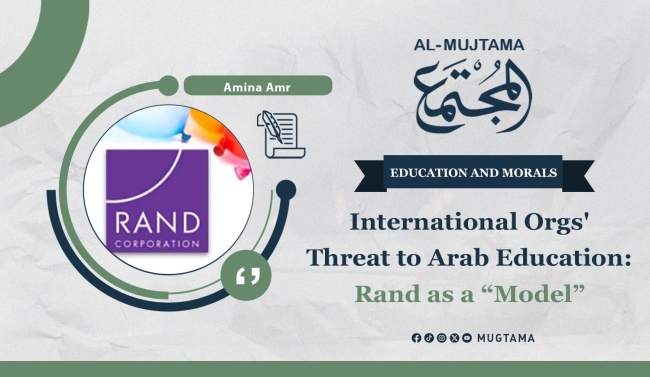International Orgs’ Threat to Arab Education: RAND as a “Model”
Throughout history, the forms of interaction and cooperation between nations and civilizations have varied, reflecting the level of human and social development humanity had reached at different stages. International organizations, as a modern form of cooperation and integration between states, are particularly linked to the 20th century, specifically post-World War I. Their declared goals have largely been to maintain global security and peace and to enhance efforts for international collaboration.
However, the real surge in the establishment and proliferation of these organizations occurred after World War II. The victory of Western nations, led by the United States, and their emergence from the war as superpowers enabled them to establish a new international order aligned with their vision and interests. The rivalry with the Eastern Bloc, led by the Soviet Union, drove these nations to find many international organizations that served their interests and extended their dominance over the global community, embedding Western values and mechanisms into these institutions and spreading them globally through programs for economic support, development, culture, and education.
In this context, and specifically in 1943, the RAND Corporation was founded by Walter L. Biddle Smith and Henry Harnung, with support from the U.S. Air Force. Its aim was to provide research and analyses to assist the U.S. Air Force and government in strategic military planning.
With the United States focusing intensely on shaping the Middle East to suit its interests, RAND recommended balancing power within the region to align with U.S. interests, emphasizing the need to strengthen "Israeli" military capabilities against neighboring Arab states.
Although RAND became independent from the U.S. Air Force in the 1950s, it has remained connected to the government and other American institutions, with its analyses continuing to serve as references and justifications for many U.S. policies.
Despite RAND's institutional independence after its early years, its reliance on funding undermines its claimed objectivity. Over time, it has also been associated with a network of funders with diverse interests, raising doubts about the neutrality and independence of its research.
In recent years, RAND has played a significant role in advising on and implementing educational reform and development processes in several Arab countries, including the Gulf states, Egypt, Syria, and Yemen, among others. It has established numerous partnerships with Arab universities. Considering its origins, the history of its establishment, and the network of interests it serves—most importantly, the Western model it represents—the approaches and mechanisms it proposes for educational reform in the Arab world warrant scrutiny and skepticism.
On one hand, the educational policies recommended by RAND often reflect the Western model, rooted in its values and shaped by its social, political, economic, and cultural conditions. Attempting to impose such policies in Arab societies without proper adaptation can lead to further distortions in education rather than reforms.
Moreover, organizations like RAND, when addressing educational issues in the Arab context, either reduce the problem to technical and technological aspects, offering solutions limited to that level, or view the values of Arab environments as the problem, perceiving them as traditional values that perpetuate backwardness. They then recommend replacing these values with those of the modern American Western model.
On the other hand, given the critical phase that most Arab and Muslim societies are experiencing, interventions by institutions like RAND in educational systems raise concerns about aligning education with external agendas at the levels of curricula, values, and even the framing of questions that capture students’ attention. This includes defining who is considered an ally or adversary, resulting in an educational product disconnected from its identity and heritage.
These accusations strengthen the hypothesis of the dangers posed by such international organizations, which are driven by the interests of their funders and display unethical biases against Arab and Muslim societies. This necessitates a proactive response, starting with critically examining the recommendations these organizations offer. Education should primarily be managed by members of each society because they best understand their community's needs, challenges, and identity. This does not imply isolation but requires a clear vision for educational reform, allowing for selective learning from others while maintaining a strong foundation.
Furthermore, there is a need for equivalent research and organizational efforts. However, such efforts require a genuine belief, both at the political leadership and societal levels, in the importance and feasibility of establishing similar international research organizations. This belief must ensure adequate material and technical support, recognition of alternative models for policymaking and governance, and the formulation of internal and external policies grounded in genuine knowledge and science.
-------------------------------------------------------------


